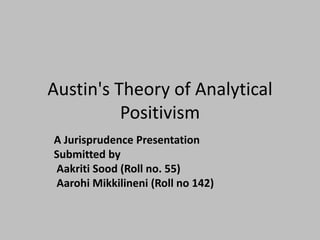Austins theory of analytical positivism
•Transferir como PPTX, PDF•
36 gostaram•17,872 visualizações
Jurisprudence presentation on Austin's theory.
Denunciar
Compartilhar
Denunciar
Compartilhar

Recomendados
Mais conteúdo relacionado
Mais procurados
Mais procurados (20)
Semelhante a Austins theory of analytical positivism
Semelhante a Austins theory of analytical positivism (20)
Theoryofsovereignty1 150428130252-conversion-gate01

Theoryofsovereignty1 150428130252-conversion-gate01
Contribution of HLA HART and Analytical school and.pptx

Contribution of HLA HART and Analytical school and.pptx
Último
Último (20)
Smarp Snapshot 210 -- Google's Social Media Ad Fraud & Disinformation Strategy

Smarp Snapshot 210 -- Google's Social Media Ad Fraud & Disinformation Strategy
Corporate Governance (Indian Scenario, Legal frame work in India ) - PPT.ppt

Corporate Governance (Indian Scenario, Legal frame work in India ) - PPT.ppt
Cyber Laws : National and International Perspective.

Cyber Laws : National and International Perspective.
CAFC Chronicles: Costly Tales of Claim Construction Fails

CAFC Chronicles: Costly Tales of Claim Construction Fails
8. SECURITY GUARD CREED, CODE OF CONDUCT, COPE.pptx

8. SECURITY GUARD CREED, CODE OF CONDUCT, COPE.pptx
Relationship Between International Law and Municipal Law MIR.pdf

Relationship Between International Law and Municipal Law MIR.pdf
Philippine FIRE CODE REVIEWER for Architecture Board Exam Takers

Philippine FIRE CODE REVIEWER for Architecture Board Exam Takers
Austins theory of analytical positivism
- 1. Austin's Theory of Analytical Positivism A Jurisprudence Presentation Submitted by Aakriti Sood (Roll no. 55) Aarohi Mikkilineni (Roll no 142)
- 2. Positivism Prof HLA Hart`s five fold meaning of Positivism 1. Law is the command of Human Beings 2. Law is as it is 3. Law is not to be derived from nor there is to be any relationship between law and other enquiries (sociology, history, etc.) 4. Legal system is a closed logical system (no external aspects can be allowed to be considered in law) Example: A.K.Gopalan v. State of Madras 5. Law is a matter of fact and it can be defended or justified unlike moral statements. Example: Capital punishment .
- 3. Characteristics of Positivism • Certainty and Predictability of Law • Scientific Study of Legal System • Definite and Verifiable Source • Sanction • Bindingness emanates from State • Distinction between Law as it is and Law ought to be. • Law can only be studied with the help of logic.
- 4. John Austin • Born in 1790 and joined the Army and served as an Army officer for 5 years until 1812. • Also a Professor of Law • Impressed by Scientific Treatment of Roman Law and used the same in England • Avoided Metaphysical approach to Law • Strict discipline and command of army life was reflected in the Austinian concept of Law.
- 5. Austins Definition of Law John Austin defined law as - “ a rule laid down for the guidance of an intelligent being by an intelligent being having power over him”.
- 6. Classification of Law Classification of Law Law set by God to men called as “LAW OF GOD” Laws set by Men to Men called as “HUMAN LAWS” Laws properly so called Laws set by Politcial superior to Political subordinates. Eg. Statues Laws set by subjects as Private Persons. Law improperly so called. Rules which are not set directly by a political Superior.
- 7. Positive Laws For distinguishing Laws properly so called from Laws improperly so called, Austin gave four Characteristics of Laws properly so called: • Command • Sanction • Duty • Sovereignty - Every positive law or every law simply and strictly so called said by a sovereign or a sovereign body of persons wherein that person or body is Supreme.
- 8. Positive Laws (contd) • Command- Law is in a form of order issued by a superior to an inferior and not a wish, desire or request. There is no option or choice to obey it. • Sanction- If law is not obeyed, there is the fear of punishment. • Duty- Person to whom the order is given has a legal duty to obey it. In case of disobedience punishment is given.
- 9. Sovereignty - “if a determinate human superior, not in the habit of obedience to a like superior, receives habitual obedience from the bulk of a given society, that determinate superior is Sovereign in that society which includes the superior (society is political and independent). - Sovereign may be an individual or a body or aggregate of individuals. - 2 types of sovereignty: Positive- Sovereign receives habitual obedience from the bulk of a society Negative- Sovereign is not in the habit of obedience to a like superior.
- 10. Attributes of Sovereignty • Sovereign power is legally unlimited: no limitation or restriction on the Law making power of Sovereign • Sovereign Power is Indivisible: There can only be one Sovereign and all powers should be vested in one single hand be it Legislative, Executive or Judicial Powers. • Sovereign is not Subordinate: Sovereign is in the habit of receiving obedience and not in the habit of obeying someone. • Continuous: The office of Sovereign is Continuous.
- 11. Exceptions to Command Austin accepts 3 kinds of laws , which though not commands can be included within the purview of Jurisprudence by way of exception • Declaratory Laws: passed only to explain the laws which are already in force. • Laws of Repeal: Revocation of a command • Laws of imperfect obligation: Not treated as commands because they lack Sanction.
- 12. Criticism • Sanction alone is not the means to induce the obedience. There are other considerations also like fear, deterrence, sympathy, reasons, etc., which induce a person to obey law. Force is the last resort. • No place for Judge made laws especially English law which has been created by Judicial Decisions • Customs overlooked • Command overemphasized • Failed to consider that Laws can be power conferring also.
- 13. Thank you